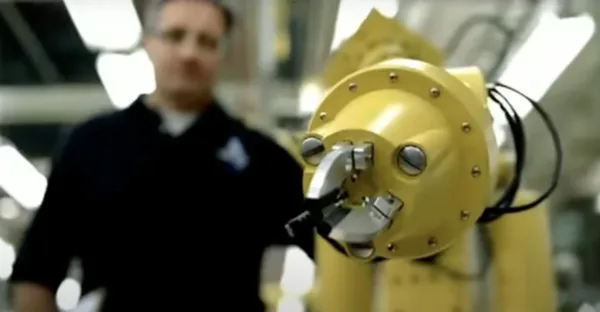Kevin Meyer, over at Evolving Excellence, gets credit for finding this first — GM's Super Bowl commercial:
My comments, posted on Kevin's site:
Imagine if the billions GM spent on technology development had been put into people development and lean. Roger Smith dreamed of the “lights out factory” in the 1980s, and we've never come close. That was the wrong vision.
As for firing people as a response to quality problems… that's what healthcare is doing mostly now. Any problem MUST be the fault of a careless individual. We're trying to help folks in healthcare understand that they have systemic problems that need systemic fixes.
After actually viewing the ad twice, I'm dumbfounded. It's depressing.
For one, the ad is inaccurate; it looks like a final assembly area, and that's NOT heavy robotic (as welding would be).

Second, it's just sad… after watching what happened to that robot, I wondered how many actual human GM employees (or former employees) have been driven into bad jobs, depression, or suicide because of what GM did to them (see: Flint, Michigan).
That ad is disgusting.
Even as the son of a 37-year GM employee (and as a former GM employee, myself) who gets a nice discount on GM cars, that ad makes me want to say “to hell with them” and never buy GM again.
Ads are supposed to either
1) sell product or
2) advance the image of the brand (which helps sell product).
How does this ad do either?
What do you think? Please scroll down (or click) to post a comment. Or please share the post with your thoughts on LinkedIn – and follow me or connect with me there.
Did you like this post? Make sure you don't miss a post or podcast — Subscribe to get notified about posts via email daily or weekly.
Check out my latest book, The Mistakes That Make Us: Cultivating a Culture of Learning and Innovation:










While I’d like to forgo the opportunity to become depressed by watching the ad, I have to agree with Mark that the emotional effects of the traditional brutal manufacturing environment can be dire. It’s only recently that post-traumatic stress disorder has been recognized by the VA, and traditional manufacturing is similar to the military in more ways than one. In particular, it’s still a macho, no-crying, if-you-can’t-take-it-you’re-a-sniveling sissy kind of culture.
An attack to the self, verbal abuse or an implied threat of the loss of employment, can be as wounding as a physical wound on the battlefield. And for guys like Mark’s dad, how many screams and lost hands and fingers did they experience over the years? Seeing friends and relatives lose jobs steps up anxiety every time it happens. A job is so deeply a part of the self in this society that just saying, “Here’s some money. I’m sure you’ll be OK, and it’s more than you deserve anyway” that is like Patton’s famous slapping the face of the shell-shocked soldier.
After enough assaults, the brains of some people become so sensitized that just the thought of loss creates a physical reaction almost as great as a loss itself. If they happen to be depression-prone, they will be likely to slip into it.
Suicide? 15 percent of people experiencing depression will complete a suicide. That’s a greater mortality rate than some cancers. 30,000 people this year will take their own lives – that’s 10 World Trade Centers every year – 100 people today. They’re not all bums on the street. (Although a large number of homeless people are homeless through loss of a job.)How many times have people said, “He’s the last person you’d ever expect to commit suicide”?
Yeah, some people will be OK. Or they will seem OK.
Mark’s not being humorless. As for GM, the “This is my country” ads implied that the firefighters at the World Trade Center were somehow connected with buying a GM truck. Made me sick.
Maybe the marketing people at GM are so depressed and being shocked repeatedly by PTSD symptoms that they can’t think anymore.
Sorry, the effect of the workplace on the brain is a hot spot for me.
Thanks for your comments, Karen. For the record, my dad is an engineer and hasn’t been in a factory environment in 35 years. But I did work in a GM factory for 2 years and I’m very sympathetic to the plight of the UAW guys I got to know well while assisting them on the line.
I would not go as far as to compare the military and manufacturing. I used to work in the primary metals industry, which is riddled with the macho tough guy thing, but even with molten metal flying everywhere, there was still that red e-stop button that makes it stop, and at the end of the day you can go home and sleep without fear of a mortar dropping on you.
I view our friends in the milirary on a whole, much much higher level. It’s one thing to feel like the boss is out to get you, but entirely another to feel that someone is trying to kill you every minute of every day.
Sorry for the off-topic remarks, but work is not life and death.
As for GM, I agree with both comments. It seems to me that, as an organization, they have 1) lost their soul, evidenced by someone even suggesting this in the first place, and 2) they have lost the ability to think, evidenced by the fact that they actually made the commercial and spend millions to air it.
What were they thinking?…they weren’t…and that’s the biggest problem of them all.
I felt the same way.. oh poor poor “robot” how many hundreds of thousands (yes, it’s that many) of US autoworkers felt that bad after being laid off (see Ben Hamper in Roger & Me)
That ad upset me too. Give me a break GM. And I was rooting for you to make a comeback. Why do you make it so hard to love you?
I would first like to assume GM wasnt mocking the thousands of layoffs that the American Auto industry had to go through. This lack of foresight might be the cause of their present dismay. As far as the Suicide watch groups are concerned though, I feel that some people have to focus on greater things than a commercial. This commercial will not be the last straw to make someone kill themselves and if it is, I cannot fathom that they wouldnt have without seeing this commercial. A real depressed person sees many aspects of life as depressing. You cant just say that they were on the road to recovery and as soon as they watched this commercial they jumped! I have suffered from depression and can honestly say that a commercial like that would actually make me smile a bit rather than make me want to kill myself. People need to stop looking at everything to make it more politically correct and start working towards getting results without having to find these self destructive ways to get publicity. One day we are going to live in a homogeneous society where everything is controlled, censored, and dull and we will have these people to blaim.